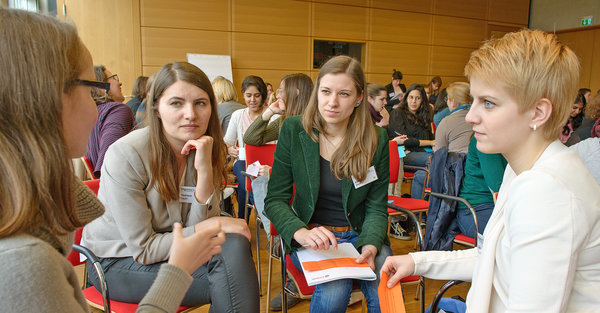
Gender-equal career development
We open doors to career success for female scientitsts
Success is not just a question of hard work, qualifications or performance. Female scientists also discover this in their professional lives and – just as in industry – they are still significantly under-represented in management roles. Stumbling blocks along the way often present as gender-specific bias or judgements, outdated gender roles and less-than-transparent structures. Women also have less access to the informal networks that make it easier to get started and progress in a career. The Max Planck Society aims to offer a solution to this situation with different networks and programs. Furhtermore Max Planck is partner of the "National Pact for Women in STEM Professions" launched by the German Federal Government in association with political circles, business, science and the media.
Minerva-FemmeNet
Positive role models – at home and abroad
Minerva-FemmeNet is a network for female scientists in the Max Planck Society. Its aim is to pass on the expert knowledge of experienced female scientists – including former institute members – by mentoring junior female scientists. Approximately 270 mentors from research and industry make themselves available on a voluntary basis; most of them have already gained professional experience and are adept at balancing family life with a career. They support and advise mentees on all issues regarding career planning and their future career path. The network's mentors are not only based in Germany but in England, France, Spain, the USA and Japan. You share in the experiences of the mentor, gain concrete ideas about the working world and get feedback on your self-appraisal. You also establish contacts and gain access to your mentor's networks.
Elisabeth-Schiemann-Kolleg
A forum especially for natural scientists
Within the Elisabeth-Schiemann-Kolleg scientific members of the Max Planck Society foster the careers of excellent female scientists after their postdoc phase, helping them to succeed on their way to a possible appointment as a University Chair or a director at a Max Planck Institute. The Kolleg offers a platform for transdisciplinary scientific exchange. The support of the Elisabeth-Schiemann-Kolleg is of ideally means. The ideal Elisabeth Schiemann Fellow has excelled in research after her PhD as a postdoc in chemistry, physics, mathematics, computer science or a technical discipline. She is about to start supervising PhD students independently as a group leader, junior professor or while working towards her habilitation: Where and how she is employed does not matter.
AcademiaNet
The MPG uses AcademiaNet: The database maintains portraits of excellent female scientists in all technical disciplines, thereby raising women’s visibility. It can be used by research institutions and governing bodies, journalists and conference organizers and for creating networks between women.
Minerva Fast Track
The Minerva Fast Track Programme gives outstanding female scientists the chance to plan their careers for the long term after completing their doctorates. Following directly on the dissertation or after the first postdoc position, funding is provided for a maximum of four years with the objective that the scientist will then apply for an Open-Topic Max Planck Research Group.
Lise Meitner Excellence Program
The Lise Meitner Excellence Program shall help to attract more excellent women into scientific careers and promote them in a targeted manner.